How to Outsource Content Writing (2026 Guide)
Content marketing relies on consistently producing high-quality content. If you’re a startup founder, a marketing executive, or a content manager, you already have lots to do!

Content marketing relies on consistently producing high-quality content. If you’re a startup founder, a marketing executive, or a content manager, you already have lots to do!

Here’s why we suggest outsourcing your content writing.
56% of companies do that, with 69% saying that content outsourcing allows them to consistently produce and publish new content.
Here’s a step-by-step guide on how to outsource content writing.
The process of outsourcing content creation breaks down into three main things.
To outsource content creation, you need to know precisely what you need.
Ideally, you should already have a content marketing strategy, though you can outsource that too.
You need to find content writers with the skills, expertise, and work ethic required to consistently produce high-quality content on time.
You may hire freelance writers directly or work with a business providing content writing services.
Note that your budget will be the main constraint regarding content outsourcing.
You need to train your content writers to meet your expectations by providing feedback on each piece.
It’s something that business owners tend to overlook. You can outsource content creation, but it will still require your attention, especially in the beginning.
Keep in mind that you can’t expect great results from outsourcing your content writing if you only provide minimal oversight.
Here’s how you can get started with outsourcing content writing.
You can outsource any type of written content, but you should probably start with outsourcing blog posts.
Begin by answering these three questions.
We recommend a content creation frequency of 1-2 articles per week. Choose a content schedule that you can stick to for at least a year.
Remember that content marketing is a marathon, not a sprint. You won’t make much difference with a single blog post, but if you produce 50 articles bringing in 10 strong leads each month, the numbers add up, and you have 500 people who can convert to your customers monthly.
We recommend investing in 2,000-3,000 word articles because they stand the best chance at ranking on Google provided they meet the search intent.
According to Backlinko’s research, long-form content significantly outperforms short blog posts and articles, so it’s better to publish fewer pieces but make them more comprehensive.
Content writing rates vary wildly. Some writers charge $0.01/word while others charge 100x more at $1/word.
However, you get what you pay for, so resist the temptation to choose the cheapest option.
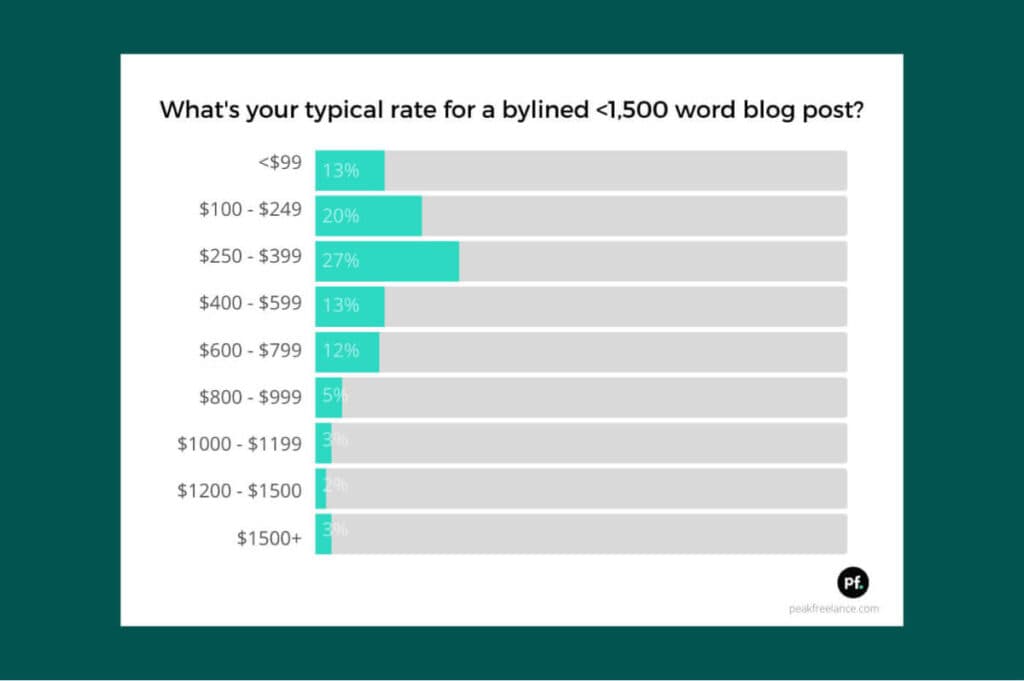
Most freelance writers charge $250 – $399 per <1,500 word blog post. If you want to outsource your content writing, you should be prepared to pay for quality. Source: Peak Freelance.
Realistically, if you want to outsource your content writing to decent writers that can consistently produce high-quality content, your budget should be at least $0.10/word.
A content brief is a set of content creation guidelines, requirements, and up-front information you provide to guide the writer.
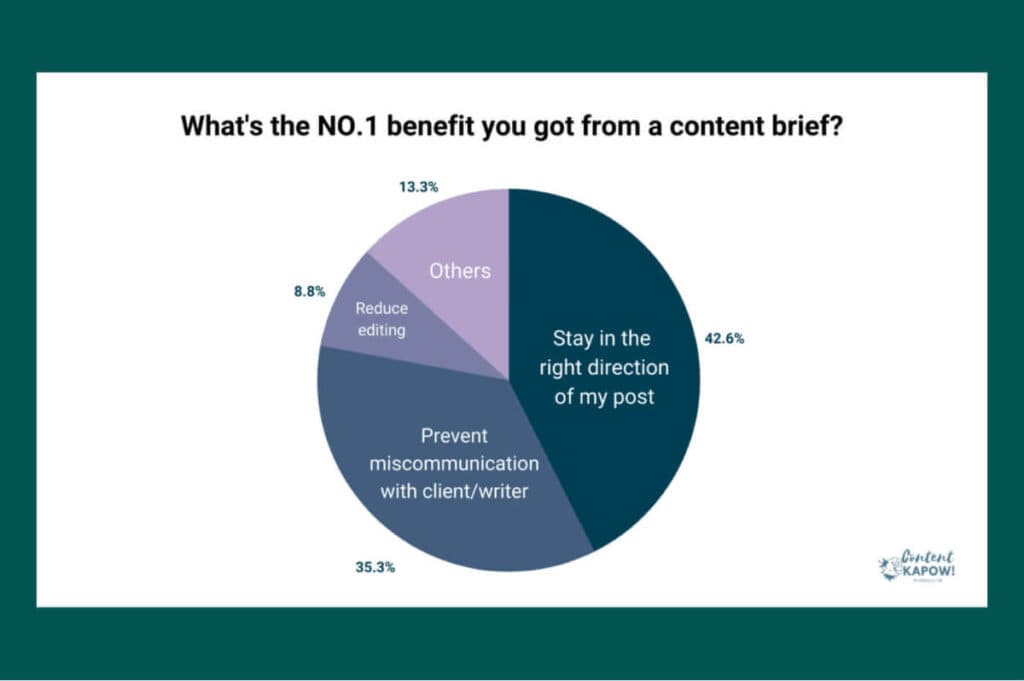
Content briefs can help you ensure the right direction for the post, prevent miscommunication, and save time. Source: Content KAPOW!.
Your content briefs should include:
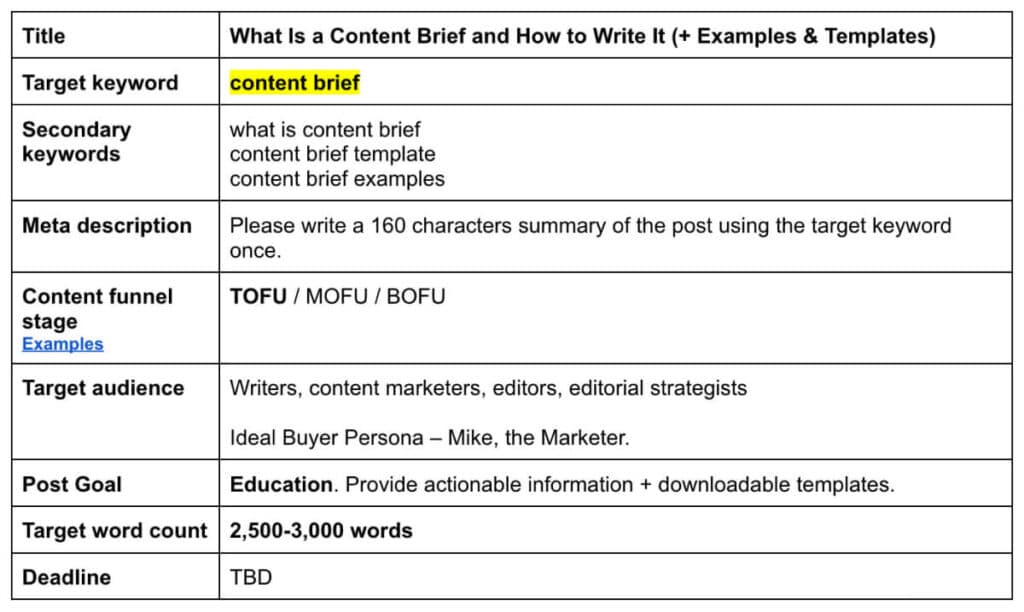
That’s just the bare minimum, though.
You might consider including more information such as style guidelines, recommended CTAs, suggested outline, etc.
When working with new writers, it’s best to make your content briefs as detailed as possible.
👉 Learn more: What Is a Content Brief and How to Write It (+ Examples & Templates)
If you want to outsource your content writing, you have three main options.
Individual content writers that operate as independent business owners.
Working with freelancers directly is more time-consuming because you have to manage them yourself, but it’s a more affordable option in most cases.
Typically, content writers only provide a content creation service, so you shouldn’t expect them to develop a content marketing strategy for you.
That’s why it’s the best option if you already have a content strategy and just need someone to handle content writing.
There’s also something to be said about the human element of working directly with content writers. It allows you to build long-term, mutually beneficial relationships with talented people.
Agencies offer content marketing services and hire freelance writers to produce content for their clients.
Working with content marketing agencies is less time-consuming because the agency manages the writers. Still, it’s also more expensive because more people are involved in content production (managers, editors, writers, etc.).
Typically, these agencies can also create a content strategy for you, so if you need one for your business, this might be the best option.
The fact that content writers aren’t working with you directly means that they aren’t as invested in your brand, which inevitably affects content quality.
These are content marketing businesses that offer content writing service packages with a clear scope for a fixed monthly fee (for example, 4 x 2,500-word articles per month for $1,000/month).
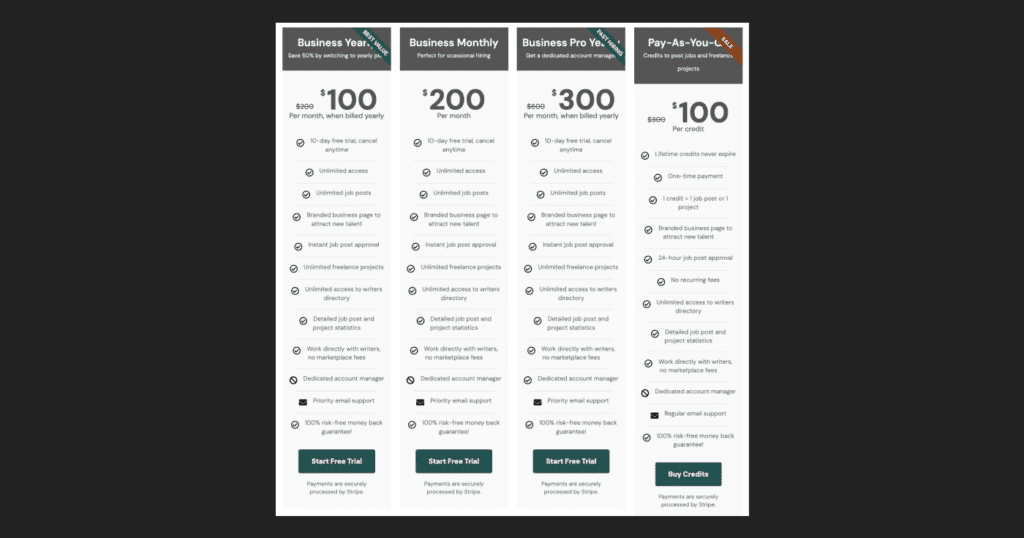
Best Writing for Business pricing plans.
It’s the least time-consuming, hands-off approach to content creation, so it might be the best choice if you’re extremely busy. It can also work well for rapidly scaling your content marketing strategy.
However, like with agencies, content writers aren’t working with you, so you can’t expect them to be as invested in your brand.
Plus, the productized service business model requires standardizing everything as much as possible, meaning it’s not conducive to developing a unique brand voice.
There is no one-size-fits-all solution to content outsourcing. It’s about making trade-offs between time, money, and content quality.
You can experiment with all three content creation options, then see which one works best for you.
Here are the three best ways to find freelance content writers:
Once you have a list of people and businesses that provide content writing services, it’s time to start reaching out to them to discuss the possibility of working together.
You should establish whether you can afford their services, so share your project scope with them and ask for content writing price quotes.
When comparing these quotes, you want to pay attention to various extras such as:
Again, it’s all about trade-offs between time, money, and content quality, so you must think carefully about what makes the most sense.
You get what you pay for, so don’t hire someone just because they are the cheapest option.
If you’re looking to hire a content writer directly, you should test the most promising candidates.
You should always pay for the test article.
Never ask content writers to do free test pieces. Professional writers will see it as an immediate “client from hell” red flag and run for the hills.
Give all potential writers the same content brief, then analyze the articles:
Say, if you want to convey a laid-back, casual vibe with your brand, then it’s best to work with writers that naturally write in a conversational style.
Remember that this is just the test article, so you can’t expect it to be perfect.
When it comes to content creation, you should probably drop that perfectionist expectation altogether.
Tracey Wallace has some great advice regarding this:
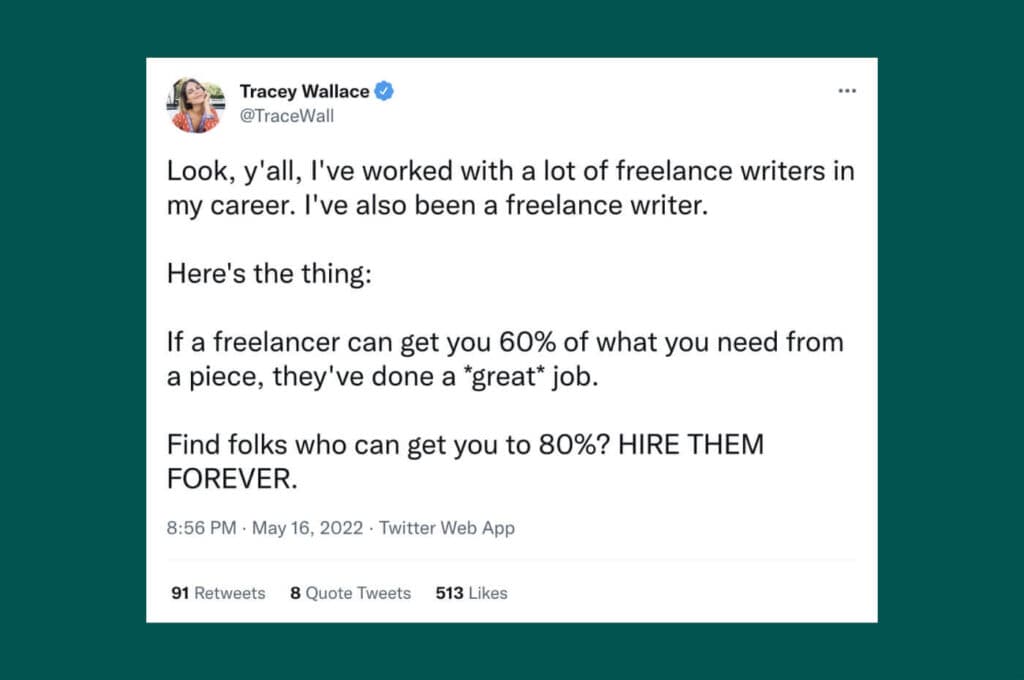
Also, if you intend to eventually build a content marketing team with multiple writers, then keep the contact details of the candidates that are promising but didn’t make the cut this time.
That way, the next time you need someone to outsource your content to, you will be able to reach out directly to these expert writers that have already proven that they can create quality content.
Once you find a freelance writer or a content marketing agency that’s an excellent match for your business, it’s time to onboard them.
Here are some things you should include in the onboarding process:
If you decide to outsource content, understand that providing feedback on each piece is extremely important. Even experienced writers need guidance when working with a new client.
Ideally, your style guide should cover all the most important content creation requirements, but you will probably still need to remind them of some things here and there until they get used to your expectations.
And when you notice that something isn’t right, resist the temptation to fix it yourself.
Keep in mind that if you don’t say anything, the writer will assume everything is okay and continue making the same mistake.
Also, remember that feedback doesn’t have to be negative. If they did a great job, tell them that!
Outsourcing content writing can be a great business decision.
In fact, if you want to scale your content marketing, then content outsourcing is a necessity.
But you need to be willing to invest time, energy, and money into it if you want to get it right.
Creating a content strategy, finding great writers, and giving them the support they need to do their best work won’t be easy.
But it can help you take your business to the next level.
🎯 Want content like this? Check Content Writing Jobs done-for-you content writing subscriptions.

An editorial plan should provide a high-level overview of your content strategy for the entire year. Here’s our 7-step guide to help you create an editorial calendar.

Explore the essentials of medical writing, including its definition, importance, types, benefits, and future trends in this comprehensive guide.

Explore what business writing is, its importance, benefits, and best practices to enhance your communication skills in a professional environment.